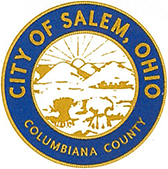Food Program & Inspections
The Environmental Health staff is responsible for licensing and inspection of food service operations and retail food establishments including restaurants, convenience stores, mobile trailers, food vending machines, and temporary food sales at events. Public health sanitarians are responsible for the enforcement and education of the ORC 3717, OAC 3717-1, OAC 3701-21, OAC 901:3-6, OAC 901:3-4.The State of Ohio requires a minimum of one to four inspections per year (depending on type of license).
As of July 1st 2019, inspection reports conducted by Salem City Health District were made available to the public online at https://healthspace.com/Clients/Ohio/Salem/Web.nsf
Ohio law requires a food service license for anyone who prepares or serves meals or portions of a meal for a charge or required donation. This includes hot or cold sandwiches, pizza, sloppy joes, etc., but generally does not include operations serving only prepackaged soft drinks, popcorn, candy bars, snacks, etc.
How To Obtain A Food Service Operation (FSO) Or Retail Food Establishment (RFE) License?
If a new FSO or RFE is proposed, the owner or operator must first complete a plan review process. A plan review application can be obtained, on-line (below under links and resources), in person or by contacting the Division of Environmental Health Services. Plan reviews must be done on facilities preforming extensive alterations or remodeling also.
Plan Review Form
If plans are determined to be acceptable, the owner or operator will receive a letter of approval and an application for a license to operate from the Salem City Health District. The letter will state any conditions, if any, placed on the facility as part of the review process. A copy of the letter bearing a signature of acceptance must be submitted with the application and fee prior to an opening inspection being conducted by a Division of Environmental Health Services staff member. Also prior to opening inspection written documentation of inspections completed and passes from the following agencies must be submitted to SCHD:
- Zoning approval – Salem City Zoning Department 330-332-4241 (Ext 228)
- Tax information – Salem City Tax Department 330-332-4241 (Ext 225)
- Utility information – Salem City Utilities Department 330-337-8723 (Ext 239)
- Building inspections – Ohio Department of Commerce (Occupancy Permit must be obtained)
- Fire inspections – Salem City Fire Department 330-337-6183
- Plumbing inspections – Columbiana County General Health District 330-424-0272 Ext. 117
In the event of a change in ownership of a FSO or RFE, the new owner must make application and submit a fee for a license to operate prior to conducting any business activities. So long as the type of FSO or RFE remains the same and/or no more than twelve (12) months has passed after the expiration of a license to operate, a plan review process is normally not necessary. However, a plan review process must occur if the type of FSO or RFE is proposed to change and/or more than twelve (12) months has elapsed after the expiration of a license to operate.
To obtain a temporary license, complete the Temporary Food Service Operation or Retail Food Establishment Application.
Food-borne Illness Complaints
We investigate food-borne illness complaints from the public. You may notify us by phone, or in person.
We investigate all food service complaints, unless deemed frivolously per the definition in the Salem City Health District Complaint and Enforcement Manual. A complaint form must be filled out by complainant and received via mail or in person by the Salem City Health District in order for SCHD to investigate a complaint.
Fillable PDF complain form
Links for further information
ODH Food Safety
ODA Food Safety
Columbiana county plumbing
Ohio Department of Commerce


